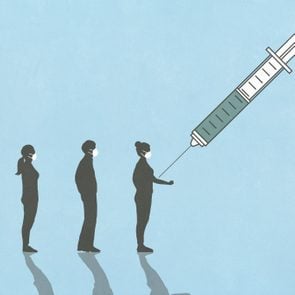What Is Covid-19 Brain Fog—and How Do You Get Rid of It?
Updated: Oct. 10, 2022
Some Covid-19 survivors report fuzzy thinking and memory problems long after the actual infection. Is there a way to beat Covid brain fog?
Brain fog after Covid-19
Covid-19 survivor Laura Gross doesn’t call what she experienced “brain fog” so much as “brain concrete.” It was that bad.
“Like an internal headache all over my body,” she says. “A vibration feeling, acute confusion, horrible memory problems and difficulty concentrating—I was no longer me.”
For a long time, Gross struggled with words, saying “coal mine” instead of “compensate.” At one point, she didn’t even recognize her ATM card.
For Gross, 72, the brain problems began early last year, at the same time as her other symptoms of acute Covid-19 infection, like fever. The condition lasted for a year, until she got her first dose of the Moderna vaccine.
She’s not alone. Many people are reporting a collection of symptoms known as “brain fog” or “Covid brain.”
Read on to find out what’s behind this mysterious syndrome, how long it lasts, and what you can do about it.
Understanding Covid brain
Covid brain is one of many issues that can plague so-called Covid-19 long haulers, or those who continue to have medical issues long after the infection has passed. It’s marked by memory loss, trouble focusing, headaches, and fuzzy or sluggish thinking.
The National Institutes of Health now calls it post-acute sequelae of Covid-19 (PASC). Cognitive impairments are just one part of the picture.
People have reported muscle and joint pain, trouble breathing, and fatigue. The symptoms can last for weeks or months.
Symptoms that linger after Covid-19 infection are so common that organizations are cropping up to connect long haulers with one another to share their experiences and connect with researchers. Gross is now a member of Survivor Corps, a grassroots education and support movement for people with long-lasting Covid-19 symptoms.
But of all long-lasting symptoms, brain fog has left people the most confused—literally.
Most people notice Covid-19-related brain fog days to weeks after the initial symptoms subside, says Shruti Agnihotri, MD, associate professor of neurology at the University of Alabama at Birmingham. Others, like Gross, experience them right away.
Who is getting brain fog?
Several studies have tried to pinpoint the number of people affected by Covid brain. One, from December 2020, looked at 120 French patients an average of almost four months after they were infected and found that 34 percent reported memory loss, 28 percent had trouble concentrating, and 31 percent had sleep difficulties.
Another study identified neurological symptoms in 82 percent of 419 patients at some point in the course of the disease, including about a third who had problems with mental function.
The issues don’t seem to be related to how severe the illness was. “We see it in patients who were in the ICU and needed intubation, but we’ve also seen it in patients with mild or asymptomatic disease,” says Dr. Agnihotri.
In fact, she says, Covid brain may happen more in people with milder illness.
Other reasons for brain fog
The medical term for a condition that triggers symptoms like brain fog is encephalopathy, which includes any disease or damage that changes the way the brain functions.
Brain fog-like symptoms have been linked to everything from menopause, jet lag, and cancer treatment to medications like antihistamines and other viral infections. Severe illnesses in general can cause brain fog.
The brain fog seen in people with Covid-19 is similar to brain fog seen from other conditions, especially concussions, says Dr. Agnihotri.
Gross, a marketing executive, has had a concussion; she says Covid brain, in her experience, is much worse.

Why is this happening?
The not-very-satisfying answer is that no one knows.
“There’s a lot of work being done trying to figure out what’s causing it,” says Aaron Glatt, MD, a spokesperson for the Infectious Diseases Society of America and chairman of medicine at Mount Sinai South Nassau. There are emerging clues.
It’s unlikely that SARS-CoV-2, the virus that causes Covid-19, is directly affecting the brain. A small study published January 16 in the journal Cancer Cell found no evidence of the virus in patients’ spinal fluid.
The researchers did, however, find inflammatory molecules, which suggests that inflammation resulting from Covid-19 infection may be impacting the brain.
The stress of being severely ill could also contribute, as could other persistent symptoms, like fatigue, headaches, insomnia, and body aches.
(Learn about 11 troubling symptoms and complications of Covid-19.
How long does Covid brain fog last?
Another unsatisfying answer: we don’t yet know.
Based on patients who have brain fog from other conditions, about a third recover completely, another third will have ongoing symptoms that improve gradually, and others will have permanent issues (more common in folks who were intubated, had organ failure, or who were under anesthesia).
The concern about how long the symptoms could last may also be contributing to the problem.
“This is one of the things that worries patients the most,” says Dr. Agnihotri.
What you can do
There’s no specific treatment for these post-Covid-19 symptoms, says Dr. Glatt. But you’re not completely powerless.
Many of the same strategies used to boost your brain in general may help in this specific instance as well.
So get exercise and plenty of sleep. Eat a healthy diet high in fruits, vegetables, and whole grains. And avoid alcohol and drugs.
“We certainly focus on things that we know that we can change or improve,” says Dr. Agnihotri. “We focus a lot on management of sleep and sleep hygiene.”
That can ease the anxiety, which only exacerbates brain fog.
Health care professionals also look for underlying depression, medication side effects and may turn to counseling and psychotherapy.
Gross found ways to compensate. She left messages for herself that she had taken her pills, kept multiple lists going, and only did one thing at a time.
Though she is much better now, she takes a rest if she feels at all tired.
When to see a doctor
If you have continuing symptoms of Covid-19, especially if they’re getting in the way of your work or daily life, see a health care professional. When Gross contracted Covid-19 more than a year ago, not much was known about the disease. Now we have more information and more ways to treat symptoms.
There is hope. “Having done this now for some months with our post-Covid-19 clinic, I can say a lot of patients improve as time goes on,” says Dr. Agnihotri.
Next, find out how Covid-19 can affect your brain.



